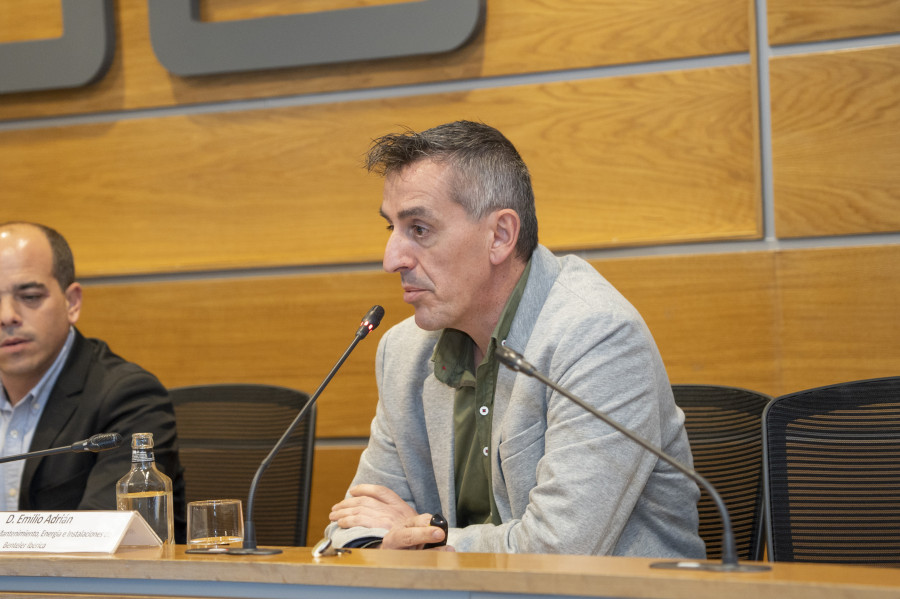Digitization and automation in maintenance

Emilio Adrián, Maintenance, Energy and Facility Manager at Benteler Ibérica Holding, structured his presentation explaining his vision of the automotive industry market and how it affects the job market in terms of the qualification of technicians and operators. Also the impact of automation from the stress of maintenance teams and the supply of components. And finally, digitisation as a support tool for maintenance teams.
The head of Benteler went back to a pre-Covid situation when there was a scenario of “solid hierarchies, stability in orders and somewhat rigid structures. The challenges were summed up in an adequate maintenance of production and undertaking new projects in a sustained manner. Covid taught us to work in a different way, with sudden stops and discovering how inflexible we were and it posed a challenge to our adaptability. Today we face a different world from the one we had before, with a strong need to adapt production to demand and with high instability in the supply chain.
"Regarding the job market, the world of the automotive industry has lost its attractiveness and we are facing a generational replacement difficulty in the face of a type of employment at the polls, with high-pressure work environments, job instability and difficulty in compatibility with teleworking. However, companies will need more than 200,000 engineers in the next ten years in Spain. In maintenance, highly qualified technicians are needed to deal with three obsolescence vectors in terms of new facilities, new technologies and "new external requirements", since we are suppliers of other areas of the company such as logistics and security".
“The old profile of a maintenance technician required knowledge in PLC, robotics, pneumatics, hydraulics, electricity, mechanics and a lot of flexibility in time availability. Now, to that base are added skills in project management, energy management, digitisation, computing, data analysis, cybersecurity, etc. All this represents a challenge for maintenance departments”.
“The impact of automation is reflected in a smaller number of operators for more complex processes, but there is less knowledge of the machine by the operator. The machines incorporate a greater number of automatic elements that increase the stability of the process, but the stops for revision are lengthened. The rate of automation increases, but the processes lose robustness. In maintenance, the technological delta is increasingly aggressive and the impact of automation on the team is often not considered. The reduction of operators in production can lead to an increase in the maintenance area. Added to these known factors are the difficulty of supplying automation components and spare parts, with the consequence that continuous processes become discontinuous. On the other hand, from the Industry 4.0 concept, digital twins and process simulation come into play, which implies multivariable predictive maintenance”.
“Digitization understood at the office level helps us a lot. We are currently immersed in a large process of changing and updating our maintenance management software, which allows our systems to intercommunicate with the management of financial and operating costs. We have better historical information for decision making in failure situations. Digitisation, in terms of simulating processes and even plants, makes updating processes easier to implement and increases the guarantee of success, which is also a very positive factor. We have a high level of digitisation of the entire plant in all factories. Not all factories at the same level, but with good data capture, which we are learning to read more efficiently and make decisions based on that data. We are taking the first steps in the use of Big Data”.
Emilio Adrián concluded his presentation by detailing real examples of application of maintenance in the analytic cells based on the monitoring of the circulation currents; in the maintenance of welding equipment based on the monitoring of wire drag currents/forces; and in the prevention of breakdowns by monitoring key parameters in stamping processes.
Presentation published in AutoRevista 2.375 issue
Lea esta presentación en castellano
Watch the full conference on the AutoRevista YouTube channel

EQUIP AUTO París 2025 celebrará su 50º aniversario, con el patrocinio de Emmanuel Macron, presidente de la República francesa, con una edición histórica y festiva. Del 14 al 18 de octubre de 2025, en Paris Expo Porte de Versailles, la feria congregará a más de 1.400 expositores y marcas en 100.000 m² y espera la asistencia de 100.000 profesionales.

CUPRA ha renovado sus modelos Formentor, León y León Sportstourer, combinando un diseño atrevido con tecnología inteligente y de vanguardia. Las últimas novedades incluyen la avanzada iluminación Matrix LED Ultra, una mayor ayuda a la conducción gracias al asistente de tráfico cruzado delantero, y el nuevo color de carrocería Dark Void.

ASEPA ha presentado la nueva línea editorial de sus publicaciones con la creación del ‘Observatorio EVomarket’, que tiene como objetivo ofrecer a todos los profesionales de la automoción una información clara y rigurosa de la evolución del mercado de los vehículos electrificados en España vs. Europa.

Pirelli ha lanzado al mercado un neumático producido con más del 70% de materiales de origen natural y reciclado, entre los que se incluye caucho natural certificado por FSC (Forest Stewardship Council).

AutoRevista participó en la reciente prueba dinámica del nuevo Renault Symbioz, SUV del segmento C que se ubica entre los modelos Captur y Austral. Texto y fotos: Luis Miguel González
